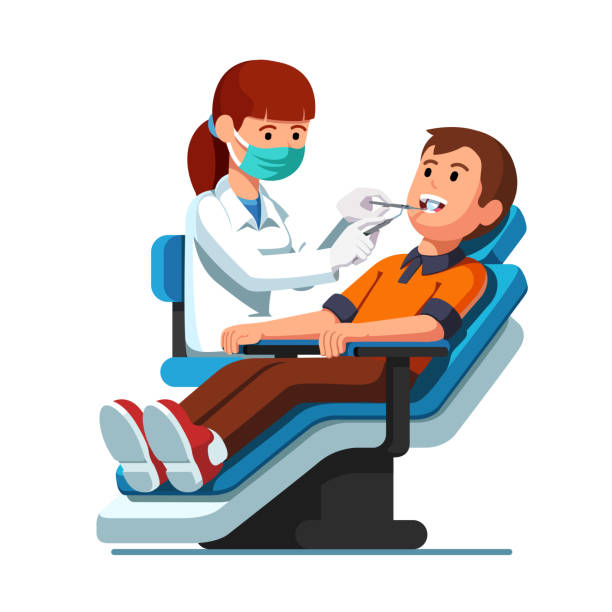A Guide to Typical Dental Conditions That Need a Dental professional's Treatment
Toothaches, for example, can be symptomatic of extreme concerns such as tooth cavities, split teeth, or abscesses, each needing particular interventions like dental fillings or origin canals. Affected wisdom teeth and jaw problems can present considerable pain and difficulties.
Toothaches
Toothaches are an usual dental condition that can vary from moderate discomfort to extreme pain, typically indicating a hidden problem that requires specialist interest. This pain can originate from a range of sources, consisting of tooth decays, split or fractured teeth, and dental abscesses. Each of these problems positions significant threats if left without treatment, potentially bring about a lot more severe problems.
Dental tooth cavities, also recognized as cavities, are triggered by the accumulation of plaque that wears down tooth enamel, resulting in holes or pits in the influenced teeth (dentist in eugene oregon). Split or fractured teeth, on the other hand, may arise from injury, grinding, or biting right into tough objects. These architectural problems can subject the sensitive inner layers of the tooth, creating pain and raising the danger of infection. Abscesses hurt infections at the origin of a tooth or in between the periodontal and a tooth, generally resulting from extreme degeneration or neglected tooth cavities.
Effective therapy of toothaches involves resolving the origin. This may consist of fillings for cavities, crowns for split teeth, or root canals and antibiotics for abscesses. Very early treatment by a dental specialist can prevent additional wear and tear and alleviate pain, ensuring ideal dental health.
Gum Tissue Condition
Gum tissue disease, a prevalent yet typically forgotten oral problem, manifests through swelling and infection of the gum tissues and sustaining tissues. If left untreated, gingivitis can advance to periodontitis, a much more serious type defined by the damage of the supporting bone and connective tissue, eventually leading to tooth loss.
The main source of periodontal illness is bacterial plaque, a sticky, colorless film that constantly bases on teeth. Poor dental health, smoking cigarettes, hereditary proneness, and particular clinical conditions, such as diabetes, can intensify the risk of developing gum tissue condition. Routine dental check-ups are crucial for early discovery and monitoring of this condition.
Treatment for gum condition varies from expert oral cleaning and scaling to advanced treatments like root planing and periodontal surgical procedure, relying on the intensity. Preserving good dental hygiene practices, consisting of brushing twice daily, flossing, and making use of an antibacterial mouthwash, can significantly lower the danger of gum condition and promote much healthier gum tissues.
Cavities
Cavities, additionally referred to as cavities, are a common oral condition identified by the damage of tooth enamel due to acid-producing germs in the mouth. These bacteria prosper on sugars and starches from food and drinks, creating acids that progressively erode the enamel, leading to tooth cavity formation.
Early-stage tooth cavities may not reveal symptoms, however as they proceed, they can trigger tooth pain, sensitivity to chilly or warm, visible holes or pits in the teeth, and discoloration. If left neglected, dental caries can penetrate much deeper layers of the tooth, possibly resulting in serious discomfort, infection, and also tooth loss.
Stopping cavities includes a mix of excellent oral hygiene methods and nutritional practices. Routine cleaning with fluoride tooth paste, flossing, and routine dental examinations are crucial. Dentists may additionally advise additional safety nets, such as fluoride treatments and dental sealants, to protect teeth from degeneration.
Therapy for dental caries depends on their seriousness. Minor tooth cavities can be attended to with oral fillings, which recover the tooth's framework. If the decay has gotten to the tooth's pulp, extra innovative cases may call for crowns or useful content also root this contact form canal treatment. Timely treatment by a dental practitioner is important to avoid problems and maintain total dental health and wellness.

Impacted Wisdom Teeth
Influenced wisdom teeth are a widespread oral issue that takes place when the third molars, frequently described as wisdom teeth, stop working to totally emerge or line up effectively within the mouth. This condition commonly arises from insufficient area in the jaw or an irregular development angle of the teeth. Impacted wisdom teeth can cause a selection of complications, including infection, discomfort, and damage to surrounding teeth.
When knowledge teeth come to be impacted, they are frequently partially emerged or stay totally underneath the periodontal line. This partial eruption can create a path for microorganisms to get in the gum tissues, leading to infections that manifest as swelling, pain, and even fever. Additionally, impacted wisdom teeth can exert stress on bordering teeth, possibly creating crowding or changing.
A comprehensive oral assessment, generally entailing X-rays, is necessary for identifying impacted knowledge teeth. Regular oral check-ups are a good idea to keep track of the problem and maintain dental wellness.
Jaw Disorders
Jaw disorders, jointly called temporomandibular joint (TMJ) problems, include a series of problems that affect the jaw joint and bordering muscles. These problems can manifest with symptoms such as discomfort or inflammation in the jaw, problem eating, a clicking or popping audio when opening or shutting the mouth, and even persistent headaches. TMJ conditions can emerge from different variables, including joint inflammation, jaw injury, or regular behaviors like teeth grinding or jaw clenching.
Medical diagnosis of TMJ conditions generally includes a thorough analysis by a dental professional, including a physical evaluation of the jaw, dental X-rays, and in some cases advanced imaging methods like MRI or CT scans to evaluate the joint's condition. Non-invasive approaches such as physical therapy, dental splints, and drugs intended at minimizing inflammation and pain are frequently first-line have a peek at these guys therapies.
Very early treatment by a dental professional is crucial to stop the progression of TMJ disorders and to keep general oral health. Patients experiencing relentless jaw discomfort or dysfunction should look for timely assessment and treatment.
Conclusion
Toothaches frequently show underlying issues such as tooth cavities, cracked teeth, or abscesses, needing punctual treatment. Impacted wisdom teeth and jaw problems also need specialist focus to reduce discomfort and protect against further issues.
Oral cavities, likewise recognized as decays, are caused by the accumulation of plaque that wears down tooth enamel, leading to openings or pits in the influenced teeth. Abscesses are uncomfortable infections at the origin of a tooth or in between a tooth and the gum, usually resulting from extreme degeneration or untreated tooth cavities.

Additionally, influenced wisdom teeth can apply pressure on bordering teeth, potentially triggering crowding or shifting.